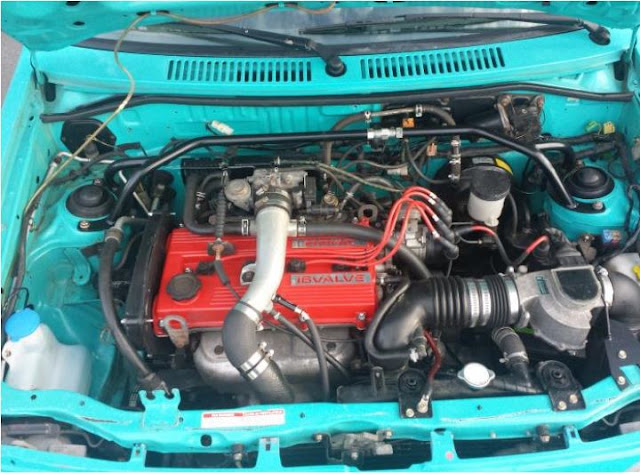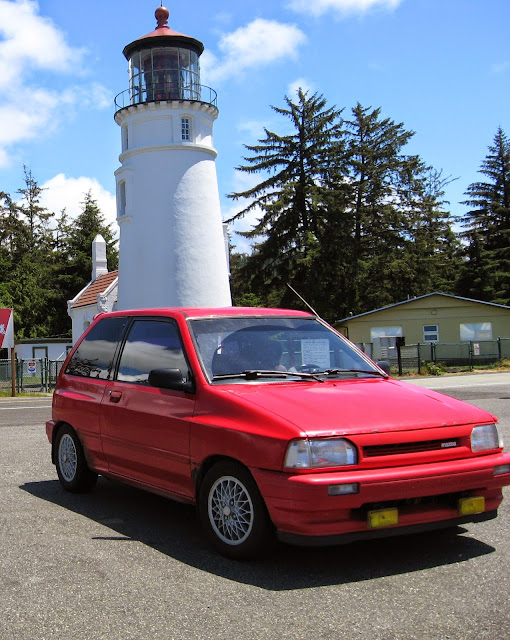Photos courtesy Ian Cassley
There was time when I wasn't sure which way I was going to go with my automotive obsession. I knew I wanted a project vehicle but didn't have much money. I wanted bang for the buck, something different, and something with potential to be fast or capable. I somehow found myself looking at Ford Festivas. Stay with me here ...
I found out there's a thriving band of fringe lunatics (my favorite type of automotive personality, since, well, I'm one of them) that is into modifying Ford Festivas. No, not Fiestas, Festivas. As in the late 1980s/early 1990s Ford econobox. These little runabouts were made by Kia (before Kia was sold in the U.S.), and also sold as the Mazda 121. They were slow, frugal, bare-bones vehicles, albeit with a willing chassis. Like any group of wonderfully eccentric auto enthusiasts, some people found out how to make the Festiva faster, handle better, and look cooler.
Enter Ian Cassely. Ian, who hails from Calgary, Alberta, has been a Festiva enthusiast for some time and runs the blogger site Econobox Café. There he's chronicled his Festiva builds, life with his Festiva, travels with his Festiva, and all things, well, Festiva.
WHY FESTIVA?
Ian says that after more than 20 years with one job that provided a company vehicle, he started a new job that had a 50km/30 mile round trip commute. Because of this, they picked up a second vehicle."The main criteria for the purchase where fairly basic: great gas mileage, fun to drive, relatively inexpensive and easy to work on," he said. "The first car we picked up was a second-generation VW Jetta Carat that had been properly lowered on Tokico coilovers. It turned out that this met the first two criteria but not the third. When we decided to sell that and find something else I remember reading an article in the August 1988 edition of Motor Trend magazine written by Don Fuller featuring an '88 Festiva that they tweaked just a little. My favorite quotes from that article are 'On a winding mountain highway, it's an unqualified blast,' and 'There are few street cars that attack corners with more ferocity.'"
THE PROJECT BEGINS
In early 2001, Ian bought a 1992 GL Festiva with low miles. He had the vehicle for quite a while—12+ years—and did a ton of upgrades, all the way to the popular B6 engine swap. Of course, that engine wasn't left stock. It included things like a FMS lightweight flywheel, 2" custom exhaust, header, performance cam, and a ported and polished head. Suspension bits included Tein coilovers, stainless brake lines, adjustable sway bar, and upgraded brakes. It rolled on 13" Toyota mesh wheels wrapped in stickier Federal tires, and showcased a slew of bodywork and interior upgrades, such as Toyota MR2 seats and a custom steering wheel. Worldly exterior upgrades ranged from Kia Pride taillights from the UK to a Mazda 121 grille from Australia. Then, in December of 2015, after 400,000 km/248,548 miles, the engine died. Time for Festiva No. 2, which is the aqua car.Ian was able to salvage many parts from Festiva No. 1 (as seen above) for Festiva No. 2. This includes the coilovers, many exterior bits, and parts of the interior. This one, however, would be turbocharged. Ian dropped in 1.6-liter turbocharged B6T powerplant from a 1988 Mazda 323 GTX. This included needed a new ECU and wiring for the new vehicle. I won't outline the entire built as the whole thing is on his site.
 |
| Stock engine ... |
| Stock | Modified | |
|---|---|---|
| Engine Size | 1.3 L | 1.6 L |
| Valves/Cyl | 2 | 4 |
| Cam | SOHC | DOHC |
| Aspiration | Natural | Turbocharged |
| Horsepower | 63 @ 5,000 rpm | 132 @6,000 rpm |
| Torque | 78 ft/lbs | 136 ft lbs |
 |
| New turbocharged engine. |
Someday I'd love to check this little car out in person. It looks great, no doubt is a kick in the pants to drive, and represents one of my favorite things: taking a low-performance vehicle and turning it into a miniature rocket ship.






No comments:
Post a Comment